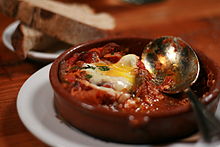Shakshouka

Shakshouka (Arabic: شكشوكة; Hebrew: שקשוקה) (also shakshuka, shavfka[citation needed]) is a dish of eggs poached in a sauce of tomatoes, chili peppers, onions, often spiced with cumin.[1] It is believed to have a Tunisian origin.[2]
Shakshouka is a kugel or fritata, that is found in several variations in Near Eastern Sephardic Jewish cooking. In Constantinople, it traditionally was served cold on Shabbat.[citation needed] Claudia Roden "in Tunisia where the dish originated" a variety of vegetables "from potatoes and fava beans to artichoke hearts and zucchini" are used, but a version "with onions, peppers, and tomatoes" has become popular in Israel. [3] The dish is prepared by frying the vegetables, and then finishing with an egg broken on top of the fried mixture. [3] A Bulgarian version contains cheese as well. [3], According to Nathan and Goldman, the name is derived from the Hebrew word for "to shake" and "every cook from from North Africa has her own version of this egg and tomato dish" [4] Roden also reports a version made with merguez, a near Eastern lamb sausage. [5]
Etymology
Shakshouka means "a mixture" or shaken in the Tunisian dialect, and is also derivation of a common last name in Tunisia "chakchouk".
History

Shakshouka is a staple of Tunisian, Libyan, Algerian, Moroccan, Egyptian, Turkish and Yemeni cuisines traditionally served up in a cast iron pan with bread to mop up the sauce. It is also popular in Israel, where it was introduced by Tunisian Jews.[6]
According to food writer Claudia Roden, Tunisian cooks added artichoke hearts, potatoes and broad beans to the dish. Because eggs are the main ingredient, it is often on breakfast menus, but in Israel, it is also a popular evening meal.[7] It has been said to challenge hummus and falafel as a national favourite, especially in the winter.[8] According to some food historians, the dish was invented in the Ottoman Empire, spreading throughout the Middle East and Spain, where it is often served with spicy sausage. Another belief is that it hails from Yemen, where it is served with zhug, a hot green paste.[8] Some versions include salty cheeses.[7]
Similar dishes
Shakshouka is similar to the Turkish dish menemen, and the Mexican breakfast dish huevos rancheros.
See also
- North African cuisine
- Tunisian cuisine
- Cuisine of Israel
- List of African dishes
- Scrambled eggs
- Piperade
- Menemen
- Strapatsada
References
- ^ Claudia Roden, The new book of Middle Eastern food, p. 168
- ^ International Inner Wheel Sfax, Nos recettes de tous les jours et jours de fêtes, p115
- ^ a b c Claudia Roden, The Book of Jewish Food New York: Knopf, 1996 ISBN 0-394-53258-9p.532-3
- ^ Joan Nathan and Judy Stacey Goldman The Flavor of Jerusalem Boston: Little, Brown, 1974 ISBN 0-316-59843-7 p. 169
- ^ Claudia Roden,The New Book of Middle Eastern Food new ed. 2008. ISBN 0-375-40506-2 p.168
- ^ Gur, Jana, The Book of New Israeli Food: A Culinary Journey, Schocken (2008) pp.80-82 ISBN 0-8052-1224-8
- ^ a b Three of a kind: Shakshouka
- ^ a b Shakshuka: Israel’s hottest breakfast dish
External links
- Jewlicious—Authentic Moroccan Jewish Shakshuka recipe
- [1]—http://howtoexpo.com/recipes/shakshuka
- [2]—Tunisian Chakchouka
- [3]—Shakshuka, Tunisian Eggs Poached in Tomato Sauce
- The Shiksa—Shakshuka recipe inspired by Doctor Shakshuka in Israel
- Kitchen of Palestine: Shakshoukeh Recipe
- Green Shakshuka Recipe
